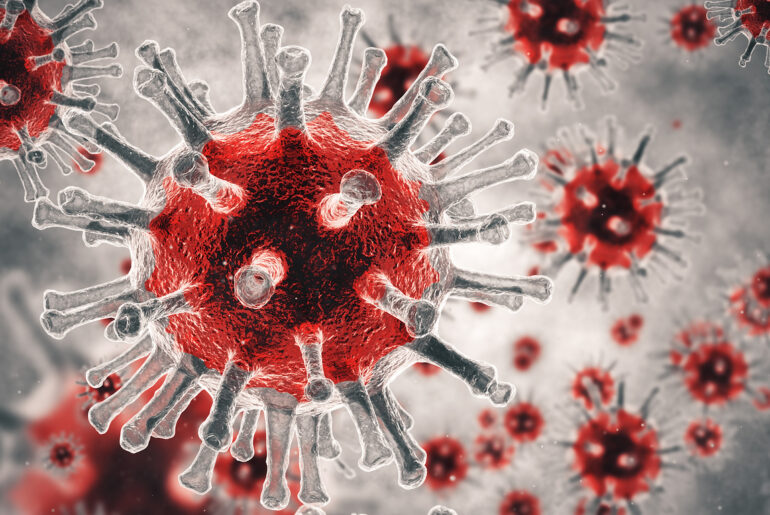Quarantine. Outbreak. Coronavirus. It seems like everywhere you turn reports of a global health crisis dominate the topic of conversations. With the surge in media coverage and warnings issued by the Centers for Disease Control and Prevention (CDC), it’s hard to ignore the impact of the virus on college students.
As of March 5, 2020, the number of confirmed cases of the coronavirus (COVID-19) in the United States is still relatively low. According to the CDC, “13 states across the country have reported confirmed and presumptive positive cases of COVID-19 since January 21, 2020.” But the fear associated with the spread of the virus, especially across college campuses, can lead to the perpetuation of misinformation.
Let’s review the facts, as reported by the U.S. Department of Health & Human Services:
- Coronaviruses are a large family of viruses that are common in people and many different species of animals.
- An outbreak of the virus was first reported in Wuhan, Hubei Province, China.
- Older people and those with certain underlying health conditions like heart disease, lung disease and diabetes seem to be at greater risk of serious illness.
- For most people in the United States, the immediate health risk from COVID-19 is considered low.
- The virus is thought to be spread mainly from person-to-person, through respiratory droplets produced when an infected person coughs or sneezes.
- Symptoms include fever, cough, and shortness of breath.
Source: Centers for Disease Control and Prevention
International student life
The spread of COVID-19 throughout the United States is expected to continue. The CDC has already issued a recommendation to higher education institutions to suspend student foreign exchange programs. While it’s impossible to predict the future impact of the virus on college campuses, students can maintain control over one area associated with COVID-19. They can fight against the stigma occurring towards Chinese and Asian students.
Lina Zhu is an international student studying at Colorado State University. Originally from Guangzhou, China, she came to the United States in August 2018 to pursue a master’s degree.
“I think there’s definitely been a few changes in attitudes on campus since the outbreak began. I think students from Southeast Asia and especially China, have been getting a lot of questions about the coronavirus. It’s mostly people with good intentions. They will ask me, ‘How’s your family doing?’ or ‘Has anyone you know been affected?’ There’s a lot of questions for us about what’s going on and why.”
Zhu hasn’t returned to China since she moved to Colorado two years ago. Although she is at a low risk for infection, she still experiences unfair judgement from members of her community.
“I think the biggest misconception is that people think we’re dangerous because of the coronavirus. For example, when I go shopping at a store, people are definitely looking at me more closely. I’m not used to getting attention like that. People look at me a few seconds longer now.”
As an international student, Zhu recommends campus counseling services increase their outreach to help students from all cultures understand the services and benefits provided.
“International Students don’t always know where to ask for help. I know we have a campus health center and counseling services, but I think my understanding of counseling centers is limited. We need resources to help with the emotional trauma we may be experiencing from how we’re being treated.”
Aside from discrimination and concerns about COVID-19, Zhu explains students need help processing the emotions that accompany worrying about their families back home.
“I worry a lot about my family. I don’t know who to talk to about that. My parents own their own business and have been experiencing financial repercussions from the outbreak. It’s a very emotional experience. I think having support and talking it through would be really helpful.”
Zhu urges students to be mindful of their actions and comments on campus. If you find yourself needing emotional support, contact your campus health center for resources.
Prevention
Currently there is no vaccine to prevent or treat COVID-19. Here’s a list of things the CDC recommends you do to help safeguard yourself against the virus:
- Avoid touching your eyes, nose, and mouth.
- Stay home when you are sick.
- Avoid contact with those who are sick.
- Cover your cough or sneeze with a tissue, then throw the tissue in the trash.
- Clean and disinfect frequently-touched objects and surfaces using a regular household cleaning spray or wipe.
- Wash your hands often with soap and water for at least 20 seconds, especially after going to the bathroom; before eating; and after blowing your nose, coughing, or sneezing.
- If soap and water are not readily available, use an alcohol-based hand sanitizer with at least 60% alcohol.
- Contact your healthcare provider immediately if you think you may have been exposed to COVID-19
Source: Centers for Disease Control and Prevention
And no – you can’t contract the virus by drinking Corona beer.
Where to find updates
For the latest up-to-date information on the transmission and spread of COVID-19, visit CDC.gov.
Check your school’s website for updates on study abroad programs, international travel, and health-related concerns.
If you believe you may have been exposed to COVID-19, contact your healthcare provider or visit a health care center on campus immediately.



